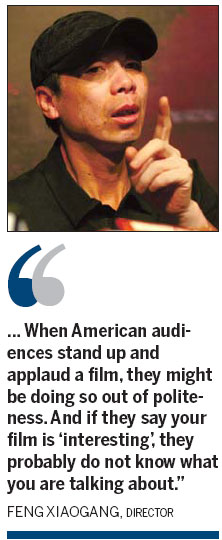Feng Xiaogang sees red
At a forum in Shanghai the maverick director slams American producer Harvey Weinstein and cautions domestic filmmakers about harboring Hollywood dreams.

Director Feng Xiaogang has been calling people names again. "Many Chinese directors say, oh, that cheat, when talking about Harvey," Feng said at a forum on "New Front for Industry Collaboration between China and Hollywood" at the ongoing Shanghai International Film Festival.
Harvey Weinstein is best known as co-founder of Miramax Films and has just co-produced the spy thriller Shanghai with China's Huayi Brothers, starring Gong Li and John Cusack.
The company has also bought advance rights for the North American and South African release of John Woo's latest action thriller, Reign of Assassins.
Weinstein sat beside Feng at the forum but left early to catch a plane.
Feng, after he left, accused him of promising Chinese filmmakers a good price to fob off other buyers, and then lowering the price by threatening to withdraw the money.
Feng also called on local filmmakers to stop dreaming about selling films to Hollywood. The best way forward, he said, was to learn its technology and use it.
"Because of censorship in China, local productions rarely have appeal abroad," he said. "Meanwhile, American audiences just do not like watching films with subtitles."
He also told domestic directors that when American audiences stand up and applaud a film, they might be doing so out of politeness. And if they say your film is "interesting", they probably do not know what you are talking about. They will say "kick ass" if they really love it, Feng said.
So far there has been no response from Weinstein about Feng's criticism, but while at the forum he did talk about his experience of collaborating with Chinese filmmakers.
"I think if you do something innovative and new, you can do anything," Weinstein said. "I co-produced with Bill Kong a movie called Hero we worked together on the production, cast and even the subtitles and little titles at the beginning and end. We really found a way to internationalize the film for people around the world to understand it."
He also referred to Crouching Tiger, Hidden Dragon (Wohu Canglong), saying that with a strong presence at press and Academy Awards, the film was successful worldwide.
Feng, however, disagreed.
"The two films Harvey mentioned survived on the dead bodies of hundreds of others. And Hollywood studios handled the two from the very beginning. They are not Chinese productions, strictly speaking, they are Hollywood action movies."
Most Chinese films, Feng said, are not accessible to American viewers. He took his black comedy, A World Without Thieves (Tianxia Wuzei), as an example. The film was the highest-grossing local film in 2005, but the feedback from American audiences was they could not understand the plot.
The film depicts two groups of thieves in a battle of wits on a train. Finally, the plainclothes police, also on the train, play a key role in catching the thieves.
"If it were a Hollywood film there would not have been any police. They would have been locked in the baggage office," he said to laughter from the seminar audience.
"It's about thieves battling with each other and to add police to the script is to add trouble. But in China, you have to pass the censorship laws, which will question why the police are not doing their work.
"I'm not surprised that American audiences cannot understand the film. If the directors are dancing with cuffs, how can they appeal to the audience?"
Describing himself as a bit dizzy after staying up too late to watch the World Cup, Feng compared China's film industry to the country's soccer team, which is the butt of jokes around the nation for its poor displays.
Currently the best thing local filmmakers can do, he said, is to learn about the new technologies that are available. He said he has done so by collaborating with IMAX, which will transfer his latest work, Aftershock (Tangshan Dadizhen), into IMAX and screen it in North America, in July.
The film, about survivors of a disastrous earthquake in China 34 years ago, has its visual effects done by South Korean companies and Technicolor.
"I dare not let Chinese companies do the visual effects," Feng said. "Due to the limited budget I turned to South Korean staffers, many of whom have learned their technology skills from Hollywood and set up their own companies in their home country."
Feng said he hopes more Chinese young filmmakers will do the same thing. "To be down to earth, to learn the technology, story telling, marketing and the agent system of Hollywood and use it in your films, that's the most practical way forward at this stage."
Yu Dong, president of the production and distribution company Polybona, had a more optimistic outlook. He suggested local filmmakers win over distributors in the United States by lowering prices, even if this is less profitable in the short term.
The other way forward, he said, is to co-produce films, which is increasingly what studios from the two countries are doing.
China Film Group has co-produced a remake of The Karate Kid with Sony, starring Jaden Smith (Will Smith's son) and Jackie Chan.
The movie is set to open on June 22, a premier slot for film releases in China. Also, co-productions are free of the 20-foreign-film per year quota that China has.
With the cachet of Will Smith and the Karate Kid's brand, the film is expected to do well not only in China, but also the US. China Film Group has reportedly invested about $5 million of the film's $40 million budget.
More co-productions are in the pipeline, such as High School Musical, co-produced by Disney and Huayi; and Empires of the Deep, featuring combination of an Avatar virtual camera operator and Chinese mythology.
 0
0 







Go to Forum >>0 Comments